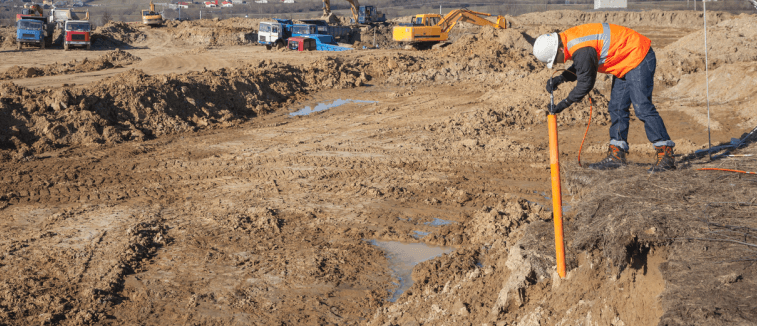Our Geotheta PDFs
Our Geotheta PDFs
Blog Article
How Geotheta can Save You Time, Stress, and Money.
Table of ContentsSome Ideas on Geotheta You Need To KnowThe Geotheta IdeasGeotheta for DummiesAn Unbiased View of GeothetaHow Geotheta can Save You Time, Stress, and Money.

They conduct site examinations, collect examples, execute laboratory tests, and evaluate information to examine the viability of the ground for building and construction projects - Geotechnical Engineers. Based upon their searchings for, geotechnical designers provide suggestions for foundation design, slope security, retaining frameworks, and reduction of geotechnical risks. They work together with other experts, such as engineers, architectural designers, and building teams, to make sure that geotechnical considerations are integrated right into the total project design and application
By analyzing the actions and residential properties of dirt and rock, they can determine prospective geotechnical risks such as landslides, dirt settlement, or slope instability. Their proficiency helps prevent failures or crashes that can endanger lives and residential property. Right here are some comprehensive responsibilities and responsibilities of a geotechnical designer: Website Investigation: Geotechnical engineers conduct site examinations to collect information on subsurface conditions.
They analyze the data to comprehend the properties and behavior of the dirt and rock, including their toughness, permeability, compaction characteristics, and groundwater conditions. Geotechnical Evaluation and Style: Geotechnical engineers assess the data gathered during website examinations to analyze the stability and viability of the site for construction jobs. They carry out geotechnical computations and modeling to examine factors such as birthing ability, negotiation, slope stability, lateral earth stress, and groundwater circulation.
Some Known Incorrect Statements About Geotheta
Structure Layout: Geotechnical engineers play a crucial role in designing structures that can safely support the intended structure. They examine the soil conditions and lots demands to determine the suitable foundation kind, such as superficial foundations (e.g., footings), deep structures (e.g (https://geotheta.jimdosite.com/)., heaps), or specialized methods like soil improvement. They think about variables such as negotiation limitations, birthing capability, and soil-structure interaction to establish optimum foundation layouts
They examine building strategies, display website tasks, and perform field evaluations to confirm that the style recommendations are followed. If unanticipated geotechnical problems occur, they analyze the situation and provide referrals for removal or modifications to the design. Danger Evaluation and Reduction: Geotechnical engineers assess geotechnical risks and risks associated with the task website, such as landslides, liquefaction, or soil erosion.

Cooperation and Communication: Geotechnical designers work carefully with various other experts associated with a project, such as architects, architectural engineers, and building teams. Efficient communication and cooperation are necessary to incorporate geotechnical considerations right into the overall task design and building and construction process. Geotechnical designers give technological experience, solution inquiries, and ensure that geotechnical needs are met.
The Main Principles Of Geotheta
Right here are some sorts of geotechnical engineers: Structure Engineer: Structure engineers specialize in creating and evaluating structures for frameworks. They assess the dirt problems, tons requirements, and website characteristics to determine one of the most ideal foundation type and design, such as shallow foundations, deep foundations, or specialized methods like stack foundations.
They evaluate the variables affecting incline stability, such as dirt homes, groundwater conditions, and slope geometry, and develop methods to stop slope failings and mitigate threats. Quake Engineer: Quake designers focus on evaluating and making structures to hold up against seismic forces. They examine the seismic risk of a site, assess dirt liquefaction possibility, and create seismic design standards to make certain the best site safety and durability of structures throughout quakes.
They carry out area testing, accumulate examples, and examine the collected data to define the dirt properties, geologic formations, and groundwater problems at a site. Geotechnical Instrumentation Engineer: Geotechnical instrumentation engineers concentrate on surveillance and measuring the habits of dirt, rock, and structures. They install and preserve instrumentation systems that monitor elements such as dirt negotiation, groundwater levels, incline movements, and architectural displacements to evaluate efficiency and offer early warnings of potential concerns.
The Best Guide To Geotheta
They conduct tests such as triaxial examinations, consolidation examinations, straight shear tests, and permeability tests to collect information for geotechnical analysis and design. Geosynthetics Designer: Geosynthetics designers concentrate on the layout and application of geosynthetic materials, such as geotextiles, geogrids, and geomembranes. They use these materials to improve dirt security, enhance slopes, supply drain options, and control disintegration.
They tend to be investigative individuals, which indicates they're intellectual, reflective, and inquisitive. They are interested, methodical, sensible, logical, and sensible. Some of them are additionally social, meaning they're kind, generous, participating, person, caring, helpful, compassionate, tactful, and friendly. Does this seem like you? Take our cost-free job examination to discover if geotechnical engineer is among your leading profession matches.
In the office atmosphere, geotechnical engineers use specialized software program tools to perform estimations, create styles, and analyze information. They prepare records, evaluation project requirements, connect with clients and staff member, and coordinate task tasks. The workplace setting supplies a favorable setting for research, analysis, and cooperation with various other specialists involved in the project.
All about Geotheta
They frequently see job sites to conduct website investigations, evaluate geotechnical conditions, and collect data for analysis. These visits include taking a trip to different places, sometimes in remote or challenging terrains. Geotechnical designers may do soil tasting, conduct tests, and display building and construction activities to ensure that the geotechnical facets of the task are being executed correctly.
Geotechnical engineers likewise operate in specialized geotechnical research laboratories. In these facilities, they conduct experiments, perform tests on soil and rock samples, and analyze the engineering properties of the materials. Geotechnical lab engineers work extensively in these atmospheres, managing screening equipment, operating instruments, and videotaping data. They work together with other research laboratory team to make certain exact and dependable screening results.
Report this page